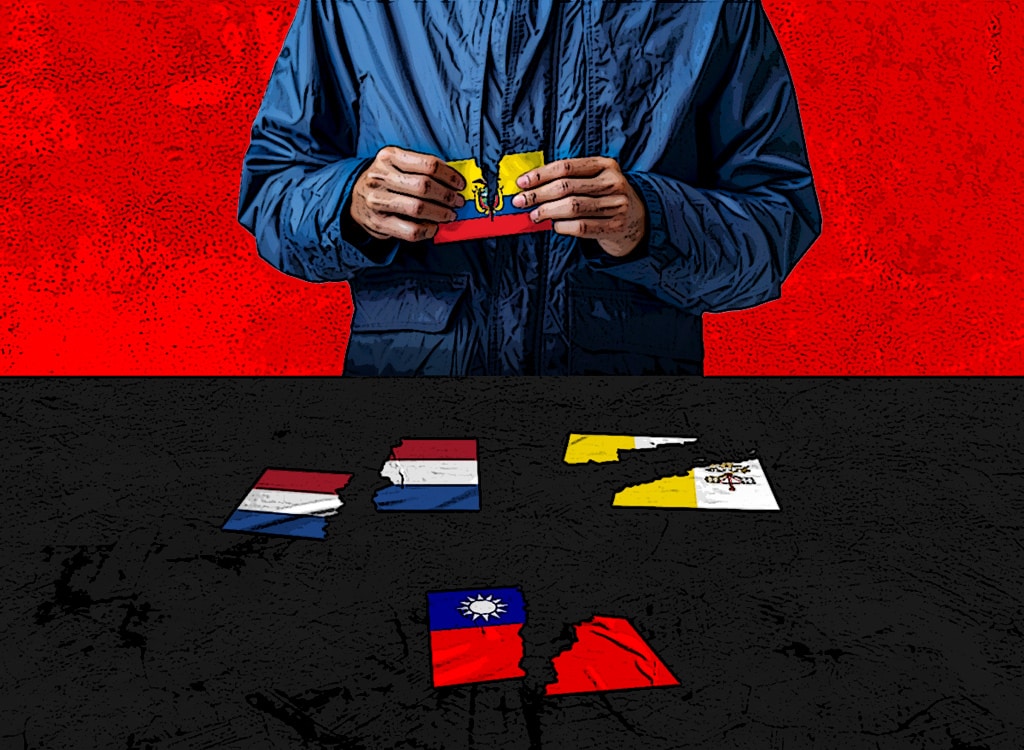
Daniel Ortega's Diplomatic Breaks

PUBLICIDAD 1M
PUBLICIDAD 4D
PUBLICIDAD 5D
At the end of six months of the civic protest against Daniel Ortega’s regime, we recapitulate the struggle through three of its protagonists.
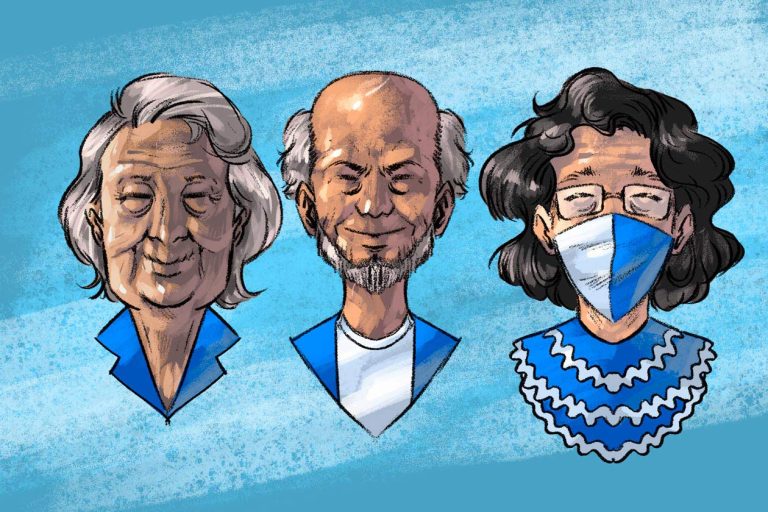
Illustration: Juan Garcia / Niú
Six months after the protests against Daniel Ortega’s regime, Nicaraguans recognize that their country is no longer the same. Uncertainty reigns amid a wave of arrests and repression against protesters, in the worse political crisis of recent decades.
The Government’s brutal repression of the protests that began on April 18th has left more than 320 dead, thousands of wounded, thousands of refugees and more than 400 political prisoners, according to the Inter-American Commission of Human Rights (IACHR) and other human rights organizations.
It has been six months of intense violence in Nicaragua since citizens took to the streets to protest against a reform by decree of the Social Security. The harsh repression of the first protests caused the discontent, which the population kept after eleven years of the Ortega Government, to turn in a wave of protests throughout the country.
With shouts demanding the departure of Ortega and his wife, Rosario Murillo from power, thousands of Nicaraguans took to the streets to express their repudiation of the regime through social networks. These are the stories of three popular characters of the civic rebellion that Nicaragua goes through.
A short, petite and gray-haired lady caught the attention of dozens of journalists who were outside the Our Lady of Fatima Seminary. Her gesture of solidarity, when she began to give away small bags of cold water to dozens of mothers who anxiously awaited the results of the now failed National Dialogue, touched Nicaragua. This is about Miriam del Socorro (Coquito) Matus, a grandmother that makes her living selling cold water, snacks and sweets; and that from that moment forward became “Dona Coquito.”
On that May 18th, this 77-year-old lady became a symbol of solidarity. “I remember that I arrived at that place and suddenly I realized that I had only managed to earn 16 Cordobas (50 cents USD), so I reflected, I saw the pain of those women who were under the sun and that is why I started to give them water,” she recalls.
“I told them to take the water to drink, I am not selling it, I am giving it away,” she saidf. She was moved and wept with the women demanding justice from Ortega’s Government for their murdered relatives.
Immediately, her gesture awoke the tenderness of many Nicaraguans who began to collect money to support her. “I have never felt so loved,” she responds every time she is asked how it feels to be a character of this civic struggle.
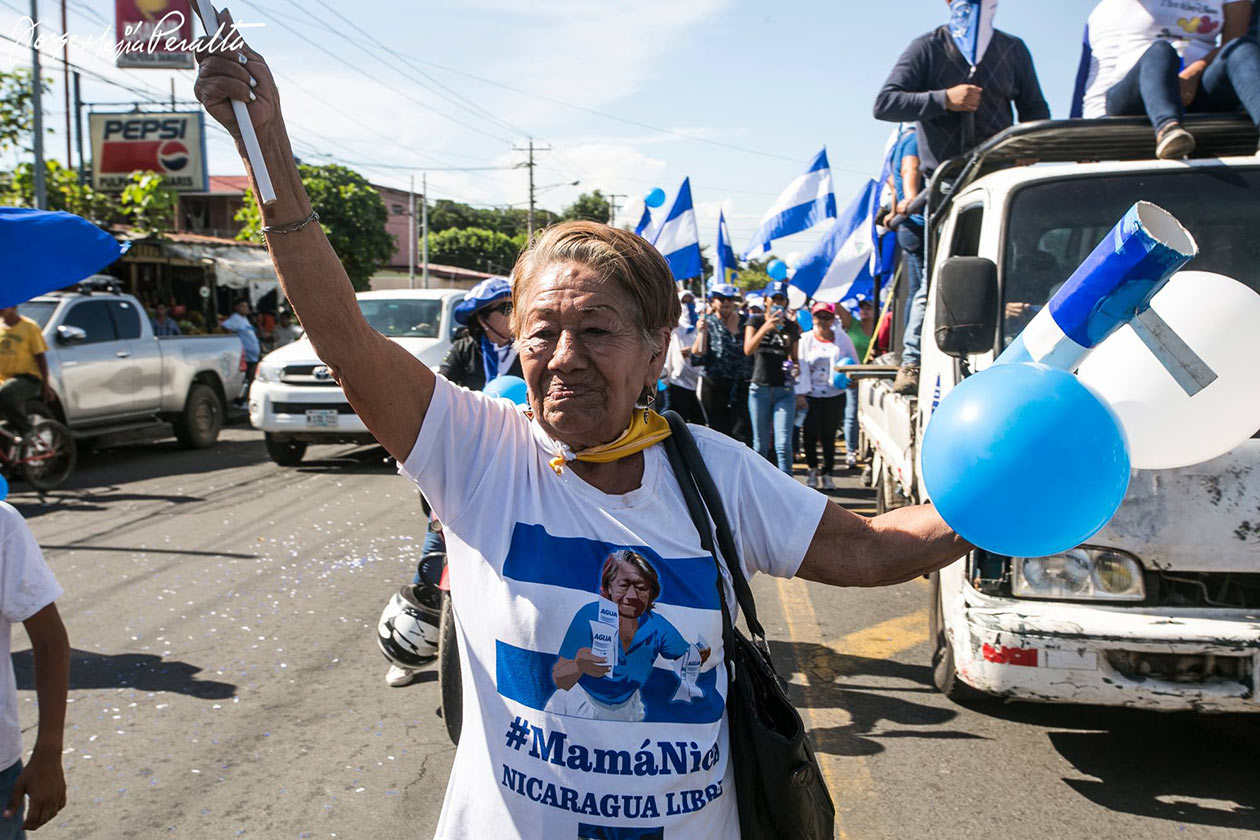
Courtesy: Jorge Mejía Peralta.
“Dona Coquito” is happy to have won the love of thousands of Nicaraguans, but also emotionally destroyed because the political crisis in the country has divided her family. Out of six sons, two of them do not speak to her. “They support the dictatorship of Daniel Ortega and we have no contact,” she explains.
For many years this lady originally from Camoapa was dedicated to washing and ironing for neighbors, but because of her age many did not hire her. “They felt sorry to put me to work,” she tells. That is why she decided to sell in a small post near the Seminary.
Seventy-seven years of age
She reveals without bashfulness
Half a dozen children
Which are her greatest pride
And, when asked about grandchildren
She responds happily:
“I am the grandmother of all the heroes of April 19th”.
That is how the song that Carlos Mejia Godoy wrote to “Dona Coquito” ends. She has also been drawn, T-shirts with her image have been made and her mischievous phrases have become memes in social networks with her witty responses to the threats of Ortega’s fanatics.
Being a visible figure of the protests has made her a target of the Ortega regime. On September 30th she was apprehended along with other protesters when she was about to participate in a protest organized in the sector of the Ivan Montenegro (Market). Several policemen forced her into a pick-up truck and one of them shouted vulgarities. “It is regrettable that this Mr. (Daniel Ortega)—who is sick with power and does not want to go—does not want to let us protest,” she said.
“I will fight for this youth that I love so much and if I have to die for them I will, but Nicaragua will be free,” stated the “grandmother” as she is called by the protesters.
On the afternoon of April 18, marathoner Alex Vanegas watched on television how a group of men on motorcycles and members of the Sandinista Youth (JS) beat on young and old who protested in Managua against the social security reforms, promoted by the Government of Daniel Ortega.
“I saw how they beat Ana Quiros. It made me angry to see an older person’s head split open. Then, I saw how they took away the cameras from reporters. I was speechless,” recalls Vanegas.
On April 20, after three consecutive days of protests, he decided to join the demonstrations against the Ortega regime. He went to the National University of Engineering (UNI), where a group of university students rebelled against the National Union of Nicaraguan Students (UNEN), known as the political arm of the FSLN in state universities. That day, Vanegas experienced repression at first hand.
“I saw where the shots were coming from and how they were riding motorcycles to hunt the UNI students,” relates the marathon runner who has been practicing this sport since the age of 39, but since he tore one of the cartilages in his knee he quit for two years.
Seeing the wave of repression that had broken out in the country, he decided to run again. As the list of murdered people increased every day, the marathon runner would make a turn for each of them in the Rigoberto Lopez Perez traffic circle, with a sign that read “I run for my country.”
So he got involved in demonstrations where thousands of Nicaraguans demand the resignation of Daniel Ortega and Vice-President Rosario Murillo. Since then “Don Alex”—as he is popularly called in the marches—has become a prominent character in every demonstration or sit-in that the “self-convoked” have called, although this has cost him three arbitrary arrests. The first in the traffic lights of “Autolote El Chele,” the second in Monimbo and the third in the Jean Paul Genie traffic circle.
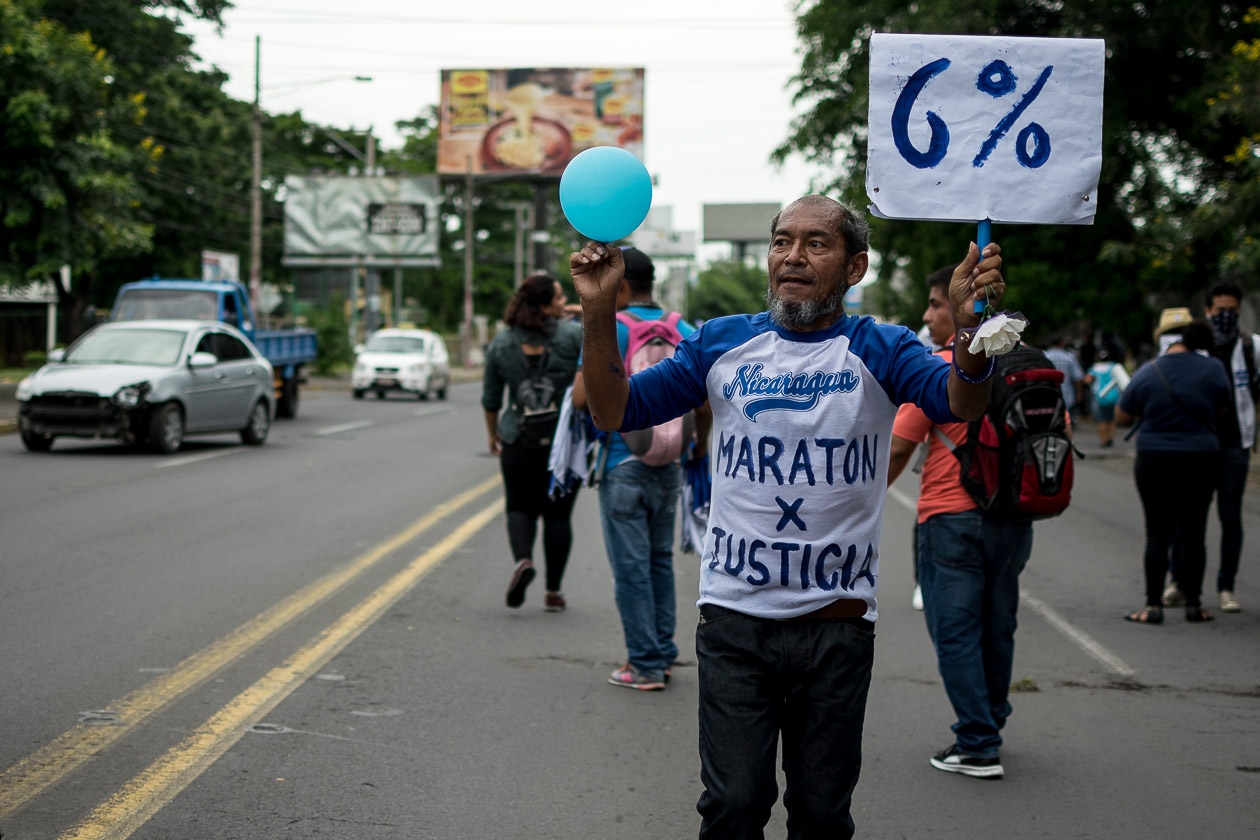
Franklin Villavicencio / Niú
Despite the constant harassment to his activism, Vanegas says that he is not afraid. “Fortunately, Somoza took away the fear of prison from me,” he commented. In his youth he participated in the Revolutionary Student Front, a movement that opposed the Somoza dictatorship. He pasted subversive flyers in the street of that Managua and also survived a cross fire between the guerrilla fighters and the soldiers of the National Guard.
“I fought against Somoza so that we would not reach this situation, but we were naïve, we were unwary,” he states.
The second kidnapping that Alex Vanegas experienced generated repudiation in social networks. It happened in Masaya on September 3, when he was racing a marathon which began on the Island of Ometepe, and his intended goal was to travel several spots of Nicaragua’s Pacific region. A National Police pick-up truck chased and arrested him. Later, he was transferred to the feared El Chipote interrogation jail and released after a few hours. The marathon runner said that while he was being transported, he was beaten.
“They released me because they were seen as ridiculous. If they shout to me that I’m crazy, I think they are more (crazy) because they are doing that to a madman,” the marathon runner commented ironically.
Flor Ramirez has been close to death many times. She was a leader of the militias in the Patriotic Military Service in the 1980s, and she is also since April 20th of this year, when she decided to join the marches against the regime of Daniel Ortega.
In the demonstrations she is known as the “patriotic dancer.” Since about two months ago she goes to the marches and wears a folk custome, which she made. She hides her face behind a blue and white scarf. She dresses like that to honor a girl that was arrested for dancing folklore in a sit-in in front of the Central American University (UCA), she tells.
“I saw how a young woman who was dancing, was attacked afterwards and the police took her. Then, I said: What is wrong? Why are they annoyed? It was then that I started making my costume and I used it for the first time on the day of the March of Flowers,” says Ramirez.
Her life before April was calmer. She worked in her house making and repairing clothes and, from time to time, she went out to preach with the members of the church she goes to. She had no problems with anyone and at that time, it was inconceivable for her that someone would go to her house to intimidate her and much less that she would be arrested.
Before being arrested, Flor Ramirez had received several threats. On one occasion, she recalls, a pick-up truck with Ortega supporters passed by her house intimidating her. They shouted vulgar words and she was able to see that they had weapons and machetes. So, the only thing she did was to close the doors of her house. For that same reason, she tries to keep herself in hiding by covering her face and avoiding to say her name. Until now.
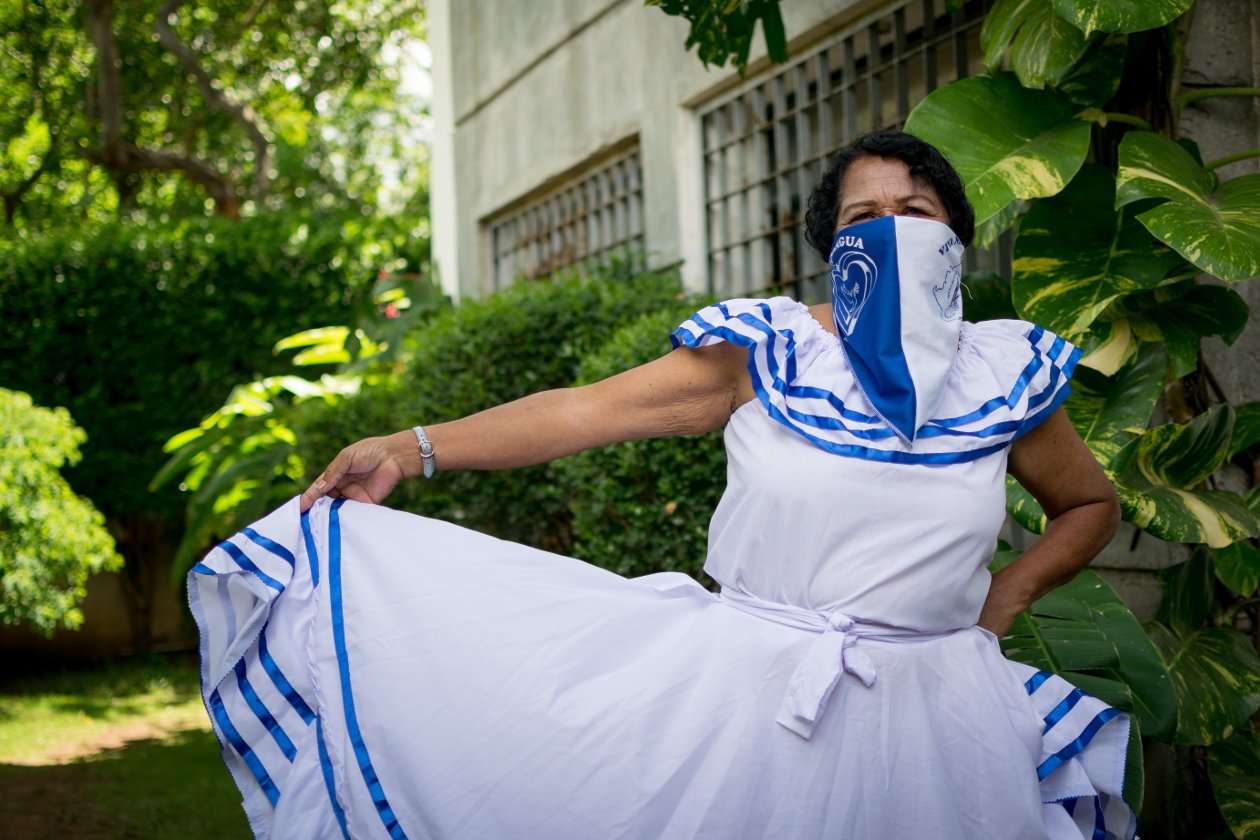
Franklin Villavicencio / Niu
Around ten o’clock in the morning of September 30th, the 63-years-old Flor Ramirez was arrested when she participated in a demonstration and later was transferred to El Chipote. She was arrested for being a “terrorist.”
“If you do not shut up, I am going to shoot you and we will disappear you,” a police officer yelled at Flor when they took her to El Chipote. There they took pictures and threatened her so that she will stop going to the demonstrations, but faced with the commotion caused by her capture, hours later they released her.
She has denounced before human rights organizations that she is being harassed. About a week ago, two men on a motorcycle followed her. Later, plain police officers and riot police stopped the taxi in which she was travelling.
“I am an ordinary woman from Managua that is not hurting anyone. I am only demonstrating against this government and they won’t impede me to continue in the non-violent struggle, in the marches, in a civic way, with my flag, with my folk costume, she says.
Archivado como:
PUBLICIDAD 3M
PUBLICIDAD 3D